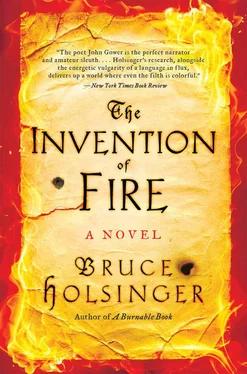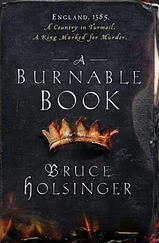Bruce Holsinger - The Invention of Fire
Здесь есть возможность читать онлайн «Bruce Holsinger - The Invention of Fire» — ознакомительный отрывок электронной книги совершенно бесплатно, а после прочтения отрывка купить полную версию. В некоторых случаях можно слушать аудио, скачать через торрент в формате fb2 и присутствует краткое содержание. Год выпуска: 2015, Издательство: HarperCollins, Жанр: Исторический детектив, на английском языке. Описание произведения, (предисловие) а так же отзывы посетителей доступны на портале библиотеки ЛибКат.
- Название:The Invention of Fire
- Автор:
- Издательство:HarperCollins
- Жанр:
- Год:2015
- ISBN:нет данных
- Рейтинг книги:3 / 5. Голосов: 1
-
Избранное:Добавить в избранное
- Отзывы:
-
Ваша оценка:
- 60
- 1
- 2
- 3
- 4
- 5
The Invention of Fire: краткое содержание, описание и аннотация
Предлагаем к чтению аннотацию, описание, краткое содержание или предисловие (зависит от того, что написал сам автор книги «The Invention of Fire»). Если вы не нашли необходимую информацию о книге — напишите в комментариях, мы постараемся отыскать её.
The Invention of Fire — читать онлайн ознакомительный отрывок
Ниже представлен текст книги, разбитый по страницам. Система сохранения места последней прочитанной страницы, позволяет с удобством читать онлайн бесплатно книгу «The Invention of Fire», без необходимости каждый раз заново искать на чём Вы остановились. Поставьте закладку, и сможете в любой момент перейти на страницу, на которой закончили чтение.
Интервал:
Закладка:
Rysyng kept his head high. “It is, Lord Mayor,” he said.
“Good,” said Brembre, though as the mayor brought his glare back down upon Norris I saw Rysyng exchange dark looks with several of the other men around the tables. Excellent, I thought. Rysyng was one of three or four aldermen on whom I held quite damaging information, though in his case I had yet to use what I possessed. I would visit the priory by Aldgate tomorrow.
As the cursory trial continued I looked over and across the bench, my eyes alighting on a slouching figure wedged against the far end of the bar. It was young Jack Norris, Peter’s son. The Earl of Earless, as the taunts named him, and he made a pitiful figure there in the depths of the Guildhall, his close-spaced and mournful eyes watching the proceeding unfold. His father’s short trial was soon concluded, the sentence pronounced. Norris would hang.
This mayor tolerated no delay in the execution of London’s convicted. Peter Norris and the two horse thieves were to be roped immediately-not at the Smithfield gibbet but out at Tyburn, as Brembre liked to keep the city free of corpses during Parliament time. The Guildhall was already emptying for the trek to the gallows, a choir of Londoners processing to sing the city’s crude office of execution. I rose with them, intent on getting a name out of Norris before his departure for the scaffold. Though the mayor’s court was still in session, the crowd had massed at the Guildhall’s south door, where I joined the departing throng.
I hurried from the Guildhall, crossed Aldermanbury, and jogged down to Cheapside, where the procession had slowed and lengthened considerably as it picked up interested spectators. Norris and the horse thieves had been stripped and thrown into a long, narrow cart drawn by two nags, led by a smirking young man strutting importantly at the head of it all. Along each side of the cart walked two of Brembre’s armed pursuivants, noses up, searching the crowd for the cantankerous and drunk. Another kept up the rear, just to the back of the rickety contrivance. The expanding mass of Londoners was raucous but not disorderly, humming with the lurid excitement of the multiple deaths to come.
London is a forgetful, even forgiving city. Only five years before, in the wake of the Rising, the crown had erected gallows across the city to string up hundreds of rebels, many of them surely kin to some of the slavering crowd now panting after the noose. Memory, I mused as I walked, will lose out to oblivion every time.
The procession had passed over the Fleet before I managed to catch up with the cart. I slowed now, and handed the rearmost guard two groats to let me take his place for a moment. He edged to the left, leaving me just feet from Peter Norris and the other thieves.
The three condemned men sat naked in the cart, legs entangled, hands bound with rope, heads lolling along the splintered rails. Already dead, in all the ways that mattered.
“Norris,” I said.
Nothing.
“Norris,” I said more loudly.
His eyes, grimed and smeared, fluttered open. His head rolled to the side. He gave me a tired scowl.
“Forget about me, Gower,” he said through the noise. “It’s too late for your contrivances and connivings. We both know it.”
One of the thieves looked up for a moment, took us in, then let his chin sink back to his chest.
“About Jack,” I said. The constable gave me a warning look, fingered his thumb. I slipped him another coin.
“What about him?” said Norris, looking off to the side. The procession had reached the far end of Holbourne, where the road narrowed and bent northward, leaving the city’s last outskirts behind. Before us stretched the parish of St. Giles-in-the-Fields, the broken spires of the leper hospital rising above the fallow plain. I heard song, faint and unenthusiastic. I looked at the sun. The brothers in the hospital chapel, intoning the work of God.
“Have you spoken to anyone about taking him in?”
“He’ll be a ward of the city, now I’m gone,” said Norris. “Your friend Strode will see to that, I suspect. Unless you want the little brigand for yourself.” A weak laugh, fading quickly. “His father’s son, that one.”
“Wardship is reserved for the moral and upstanding,” I said as the cart creaked on. “But your son is a cutpurse and a rising felon, with a mutilated head. He will be turned out of the city if he’s not hanged like you first. You want that for him?”
He twisted in the cart.
“I will set him up nicely, Norris,” I said. “He won’t lack for meals and shelter, I can promise you.”
His scowl deepened. “Why would you do such a thing, Gower?”
I took a step closer, risked leaning over the edge of the cart, and whispered, “Your witness, Norris. His name-”
Just then a new murmuring went up from the crowd. A postern door along the north wall of St. Giles had opened to reveal a gaunt figure limping from the hospital churchyard. A large hood flopped sloppily around his head and his thin neck, hiding his face. Behind him walked a brother of St. Lazarus, hale enough, to judge by his appearance, bearing a bucket and dipper. The crowd parted for the two denizens of the hospital as they neared the cart, which slowed to a halt for the dreary ritual. The lame man looked up at the prisoners, and I caught a glimpse of his face. Scarred, slashed with crusted pustules, though not with the signs of leprosy. One of the crown’s decayed domestics, I suspected, and a late case of the pox.
One of the constables took the bucket, the other the dipper, and final ales were served out to the condemned. The three men sipped eagerly, as if some grain of salvation had been fermented into the heavy brew shared among the doomed. I waited as the constables finished the remaining drink. One of them returned the bucket and dipper to the St. Lazarus brother, who led the afflicted man back into the hospital grounds. With that, the procession began anew.
“A name, Norris,” I said as the cart groaned along. “All I want is a name. Why did Brembre keep you from speaking it at the Guildhall?”
Norris’s eyes had closed again. I reached out and pressed his bare arm, hanging loosely against a cart rail. My hand nearly recoiled. His skin was cold to the touch, clammy, despite the full sun. He looked down at my fingers, then at me.
“Brembre, you say?” His eyes flashed, suddenly alert. “That scabbed swindler! You tell Nicholas Brembre I’ll be back for him, back from the grave. You tell him that for me, John Gower.”
“Think of your son, Peter. Young Jack.”
“A son, a sack of coin, the things we leave behind.” He turned and spat over the side of the cart. “All the same in the end, isn’t it?”
Now a new agitation. His hands struggled against the shared ropes, drawing low moans of protest from the other prisoners, whose limbs moved in tandem. “Save his hands, Gower, if you can,” said Norris, his eyes flashing with new awareness, as if he had suddenly woken from a stupor. He strained to lean back toward me. His mouth gaped, and he whispered hoarsely, “First the boy’s ears, and next they’ll take his hands. You must save his hands, John Gower, you must!”
“A name, Norris. Only a name, and his hands shall be safe. Your witness, Norris.”
He looked up at the clouds, then at me. “Jack,” he said, with the saddest of smiles. “Jack’s his name, isn’t it?”
Those were his final words to me, and it was clear I would get no more. It was enough. I slowed my steps as the cart pulled forward and the press thronged in.
A labored trudge up the Oxford Road brought us to the Tyburn Tree, freshly cleared of its most recent danglers. The crowd pooled almost luxuriously around the triangular scaffold as the cart creaked to a halt. The constables moved quickly to remove the three condemned. They were pitiful in their nakedness, their backs bent, their forms huddled forward as if to clutch at what dignity remained to them as they faced the high beams looming overhead.
Читать дальшеИнтервал:
Закладка:
Похожие книги на «The Invention of Fire»
Представляем Вашему вниманию похожие книги на «The Invention of Fire» списком для выбора. Мы отобрали схожую по названию и смыслу литературу в надежде предоставить читателям больше вариантов отыскать новые, интересные, ещё непрочитанные произведения.
Обсуждение, отзывы о книге «The Invention of Fire» и просто собственные мнения читателей. Оставьте ваши комментарии, напишите, что Вы думаете о произведении, его смысле или главных героях. Укажите что конкретно понравилось, а что нет, и почему Вы так считаете.












